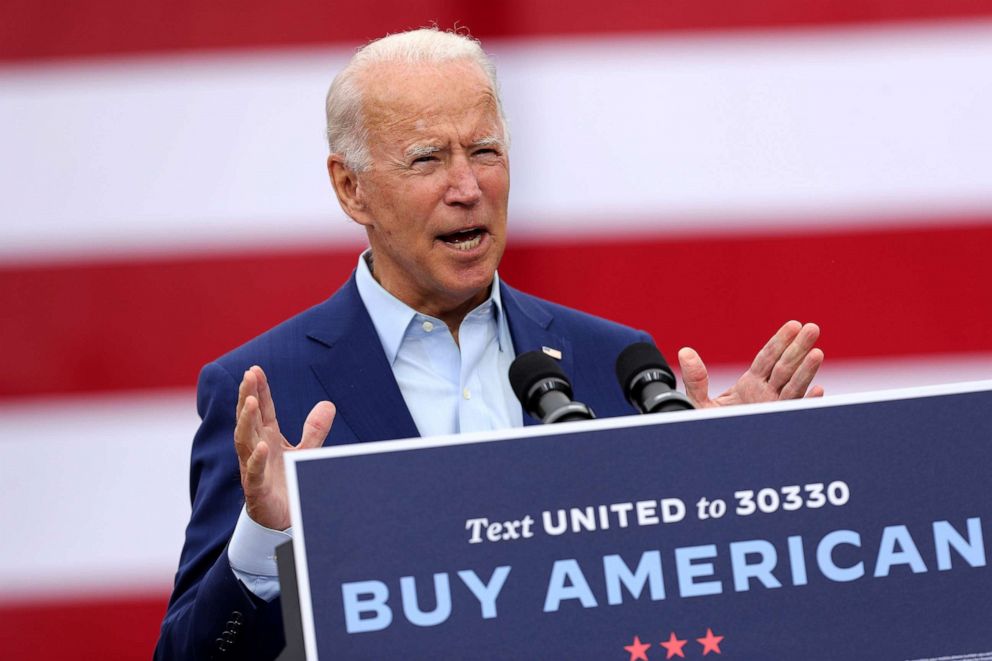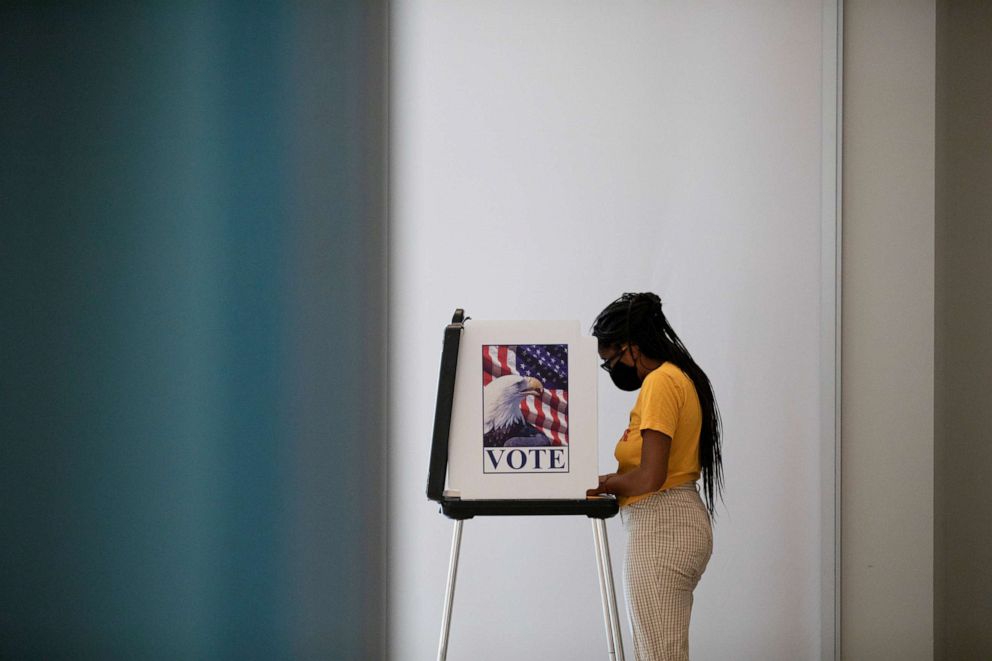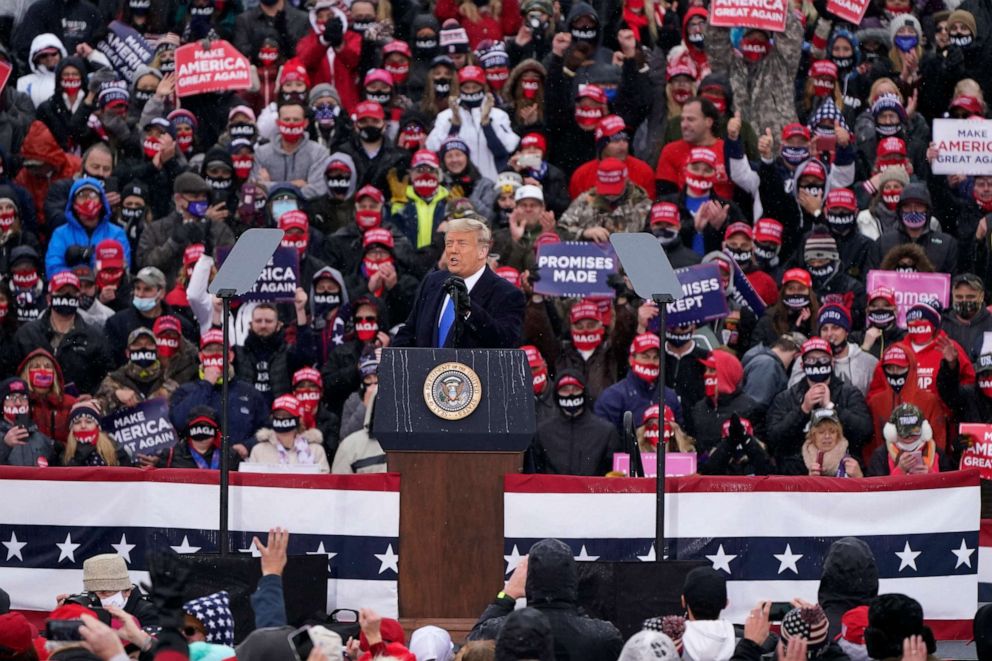COVID surge hurts Trump in Wisconsin; Biden leads in a closer Michigan contest: Poll
Biden has sizable leads among women, moderates and independents in both states.
A surge in coronavirus cases has damaged President Donald Trump's re-election campaign in Wisconsin, with growing criticism of his work on the pandemic and preference for former Vice President Joe Biden to handle it. Biden holds a slighter advantage in Michigan, with sizable leads among women, moderates and independents in ABC News/Washington Post polls in both states.
Biden leads Trump by 57-40% among likely voters in Wisconsin, a state that's now reported to be third in the nation in per capita COVID-19 cases, with a 53% increase in average daily cases in the past two weeks, a record number of hospitalizations and a 112% jump in deaths. That compares with a closer 52-46% in mid-September.
In Michigan, it's 51-44%, Biden-Trump, among likely voters, a slight Biden lead in this poll, produced for ABC by Langer Research Associates. The Senate race there stands at 52% for incumbent Democrat Gary Peters versus 46% for Republican John James, not a statistically significant difference, thus a rare chance this cycle for a GOP pickup, with control of the Senate in the balance.
See PDF for full results, charts and tables.
Vote preference results look very much like views on Trump's performance as president overall, seemingly cementing the contest as a referendum on the incumbent. In Wisconsin, registered voters disapprove rather than approve of his work in office, 58-41%. In Michigan, it's 52-46%. Both nearly match vote preferences.
Behind it all, an atypical election clock is ticking. Thirty-seven percent of likely voters in Wisconsin, and 38% in Michigan, say they've already voted. And an additional 23% in Wisconsin, and 18% in Michigan, say they will vote early or absentee. Early voters are strong Biden groups. The share planning to vote on Election Day -- broadly for Trump -- has fallen from 51% last month to 39% now in Wisconsin. It's 43% in Michigan.
One wildcard is whether voting and vote-counting are aligned. The U.S. Supreme Court on Monday effectively barred the counting of mail-in ballots received in Wisconsin after Election Day, raising the question of how many late-arriving votes will be disqualified.
Then and now
Trump won Michigan by 10,704 votes out of 4.8 million cast in 2016 and Wisconsin by 22,748 out of 3 million -- narrow victories that, with Pennsylvania and Florida, catapulted him to the presidency even while losing the national popular vote by almost 2.9 million.
Four years later, Trump's handling of the pandemic poses challenges to a repeat performance. While he has criticized mask mandates and business restrictions, about seven in 10 of registered voters in both states support these measures, with 56% strong support alike.
The disconnect is deepest in Wisconsin, which has sustained a seven-day average of more than 4,000 cases per day, the most since the outbreak began last winter. With hospital beds filling, a field hospital has been opened on the state fairgrounds. These developments have occurred even as Trump, in the final debate last week, and again in Waukesha on Saturday, said the nation was "rounding the turn" in controlling the pandemic.
Wisconsin registered voters now disapprove of Trump's handling of the pandemic by 20 percentage points, 59-39%, up from 54-44% in mid-September. They trust Biden over Trump to handle it by a similar 57-37%, up from a close 49-42% previously.

Moreover, 63% of registered voters in the state are very or somewhat worried that they or someone in their immediate family may catch the coronavirus and an additional 7% say it's already happened. Likely voters who are worried about catching the virus support Biden overwhelmingly, 75-22%.
Results are similar, albeit more muted, in Michigan, where the outbreak has been less extreme. Wisconsin has seen 71 new daily cases per 100,000 population on average in the past week, per Washington Post tabulations. Michigan has had 22 cases per 100,000.
There, 56% of registered voters are worried about catching the virus; 55% disapprove of how Trump has handled it; and Biden leads by 53-39% in trust to handle it.
The economy and attributes
Even with a pandemic-induced recession, the economy has been safer ground for Trump -- but he has challenges here as well, especially in Wisconsin.
There, trust to handle the economy has gone from 50-45%, Trump-Biden, last month, to 52-44%, Biden-Trump, now. In September, registered voters said by a 10-point margin that the economy was in bad shape; now it's a 17-point margin. And Trump's approval rating for handling the economy has lost six points, from 53 to 47%.
Michigan registered voters also rate the condition of the economy negatively, by 55-43%. Still, 52% approve of Trump's work on it, a slight five points more than in Wisconsin, and there's a 48-44% division, Trump-Biden, in trust to handle it. Biden does eight points better on this measure in Wisconsin than in Michigan.
Biden has gained in Wisconsin on personal attributes as well, going from +11 to +20 points against Trump in being seen by registered voters as more honest and trustworthy, from +5 to +17 points as better understanding the problems of people like them and from -3 to +9 points as the stronger leader.
Again, views are more divided in Michigan – Biden +9 points on honesty, +10 on empathy and, on strong leadership, -1.
An additional question asks who bears more blame for the recent feud between Trump and Michigan Gov. Gretchen Whitmer, a Democrat. Registered voters are far more likely in both states to blame Trump, by 46-23% in Michigan and 43-18% in Wisconsin. The rest say both bear equal blame or have no opinion.
Groups
While the extent of the gaps differ, Biden relies on similar groups in both states, with vast leads among women and moderates and strong results among independents -- classic swing voters in most elections.
The suburbs make up one notable difference between these two neighboring states: Biden leads Trump by 56-40% among likely voters in suburban Wisconsin. In Michigan's suburbs, by contrast, it's very close, 49-46%, Trump-Biden.
The result in suburban Wisconsin is a shift from 54-45%, Trump-Biden, last month. This chiefly reflects a swing away from Trump and to Biden in the Chiwaukee suburbs, a usually Republican region surrounding Milwaukee. Trump won there by 20 points in 2016.
There's also a difference between the two states among non-college whites, who back Trump by 56-38% in Michigan while dividing evenly, 48-49%, in Wisconsin -- Trump led by 10 points in this group in Wisconsin last month. That includes a gender gap: In both states, Trump does 13 points better with non-college white men than with non-college white women.
Biden's support from women also is evident among independents, moderates and suburbanites. In both states, he has 20 points more support from independent women than from independent men. He does nearly as well with moderate women versus moderate men. And he does better among suburban women than among suburban men by 20 points in Wisconsin and 17 in Michigan.
Preferences among older people, a group that's especially vulnerable to the coronavirus, also are striking. Biden leads by 61-37% among likely voters age 65 and older in Wisconsin -- a group Trump won by one point in 2016. In Michigan, it's a more modest Biden +12 among seniors; Trump won them by four points in the ABC News exit poll four years ago.
There's a difference between the states in recalled past vote. Among Michigan likely voters who report having voted in 2016, 47% say they supported Trump, 47% Clinton. In Wisconsin, the division was very similar in September, 45-47%; now, 50% say they supported Clinton, 43% Trump. Disillusion with Trump may have motivated some to shift their 2016 recall; this has occurred mostly in the Chiwaukee suburbs, where, as noted, 2020 vote preferences also have moved toward Biden. Regardless, adjusting the sample to reflect the actual 2016 outcome still leaves Biden with a double-digit lead.
In all, Democrats account for 31% of likely voters in Wisconsin, Republicans 27%, with the rest independents or affiliated with another party. That's similar to the division in the mid-September ABC/Post poll there, 34-27%.
Just 2% of Democrats support Trump, while Biden is backed by 10% of Republicans. In Michigan, the partisan breaks are similar, 32-28%; here 5% of Democrats take Trump and 7% of Republicans go to Biden.

Senate
As noted, the U.S. Senate race in Michigan is a close 52-46%, Peters-James, a non-significant difference. That includes virtual ties among independents and suburbanites, groups that may prove pivotal.
Peters holds wide leads among Democrats (97%), Black people (90%), liberals (87%), those worried that they or a family member might catch the coronavirus (73%) and moderates (67%). Results among Black people are among registered voters for adequate sample size.
For his part, James is lifted by Republicans (93%), conservatives (87%), those less worried about catching the virus (80%) and evangelical white Protestants (68%).
The two are essentially tied, 49-48, Peters-James, among likely voters in households that include a veteran or active-duty member of the military. Both are veterans -- Peters, a former lieutenant commander in the Navy Reserve, and James, an Army veteran who served multiple tours in Iraq.
Regionally, Peters leads by a broad 28 points, 63-35, in both Wayne County and southeastern Michigan -- including the university cities of Ann Arbor and East Lansing. James is ahead in the typically GOP-leaning east central, southwestern and north central regions.
The Senate race features few split-ticket voters. Peters carries 93% of Biden supporters, with 6% preferring James. Among Trump supporters, it's reversed: 93% support James, 6%, Peters. Also mirroring the presidential contest, about seven in 10 of those planning to vote in-person on Election Day support James; Peters wins as many of those planning to vote early, by mail or who already have voted.

Methodology
This ABC News/Washington Post poll was conducted by landline and cellular telephone interviews Oct. 20-25, 2020, among random samples of 902 Michigan registered voters, including 789 likely voters; and 906 Wisconsin registered voters, including 809 likely voters. Results have margins of sampling error of 3.5 percentage points among registered voters and 4.0 among likely voters in both states, including design effects.
Partisan divisions -- Democrats-Republicans-independents -- are 30-27-36% among registered voters and 32-28-34% among likely voters in Michigan and 30-26-38% among registered voters and 31-27-36% among likely voters in Wisconsin.
The survey was produced for ABC News by Langer Research Associates, with sampling and data collection by Abt Associates of Rockville, Maryland. See details on the survey's methodology here.
Analysis by Gary Langer, with Steven Sparks, Allison De Jong, Christine Filer and Sofi Sinozich.
This report was featured in the Wednesday, Oct. 28, 2020, episode of “Start Here,” ABC News’ daily news podcast.
"Start Here" offers a straightforward look at the day's top stories in 20 minutes. Listen for free every weekday on Apple Podcasts, Google Podcasts, Spotify, the ABC News app or wherever you get your podcasts.



